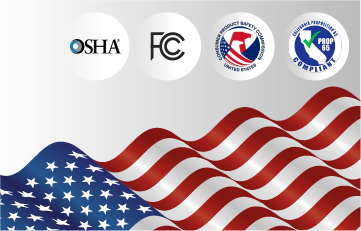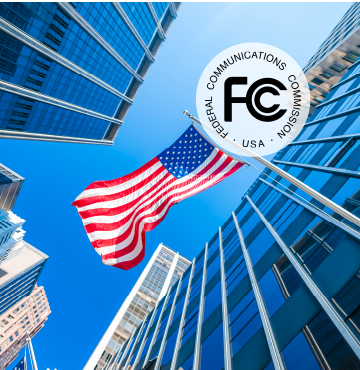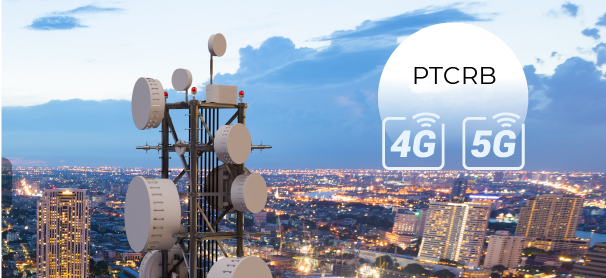Manufacturers, distributors, and importers of industrial devices in the US must comply with FCC Part 18. This regulation sets limits for radio frequency (RF) energy emitted by intentional radiators used in industrial, scientific, and medical (ISM) applications. Understanding these limits, requirements, and the testing process is crucial to avoid delays, product recalls, and financial penalties. This article provides a clear overview of FCC Part 18 and how 360Compliance can simplify your journey towards achieving FCC compliance testing.
What is FCC Part 18?
Part 18 encompasses the requirements and limits for ISM equipment to ensure they do not cause harmful interference to radio services. It sets limits on electromagnetic interference (EMI) and requires specific testing procedures. This regulation covers a wide range of devices, including but not limited to, microwave ovens, ultrasonic equipment, and notably, LED lighting. The primary concern of Part 18 is the unintentional emission of radio frequency energy that could disrupt communication systems and other electronic devices.
The Importance of FCC Part 18 Compliance Testing
Failing to comply with FCC Part 18 regulations can lead to serious consequences, including:
- Product seizure and fines: The FCC can seize non-compliant devices and fine manufacturers and distributors.
- Market access delays: Non-compliant equipment may be blocked from entering the U.S. market, causing significant delays and financial losses.
- Reputational damage: Non-compliance can damage your brand reputation and erode customer trust.
Why Choose 360Compliance For FCC Part 18 Testing
360Compliance specializes in simplifying the certification journey for manufacturers, distributors, and importers navigating the complexities of FCC rule Part 18. Our expertise lies in offering end-to-end support throughout the compliance testing and certification process.
- Expert Guidance: Our team has extensive knowledge of FCC regulations, ensuring accurate assessment of your products against Part 18 requirements.
- Testing Coordination: We manage the testing process to ensure your devices meet all necessary standards without delay.
- Documentation Support: We assist in preparing and submitting all required documentation, streamlining the certification process.
- Customized Solutions: We provide tailored testing plans and strategies to address the specific needs of your device.
- Global Compliance: Our comprehensive services ensure global regulatory compliance, allowing you to market your products worldwide.
Contact 360Compliance today to discuss your specific needs and get started on your FCC compliance journey.
Other Certifications

FCC TCB Certification
Are you aiming to enter the US telecommunications market but find the FCC TCB certification process overwhelming? Do you need expert guidance to ensure your products meet the stringent FCC standards? 360Compliance can help you navigate the complexities of FCC TCB certification with ease, ensuring your telecommunications equipment complies with all necessary regulations. Let us streamline the process and secure your certification, paving the way for successful market entry. What is a TCB? A Telecommunication Certification Body (TCB) is an organization authorized by the Federal Communications Commission (FCC) to test and certify telecommunications equipment for compliance with technical regulations. These regulations ensure device safety, reliability, and interoperability within the US market. Why is TCB certification important? Obtaining an FCC TCB certificate is crucial for manufacturers seeking to sell their telecommunications equipment in the United States. It demonstrates adherence to FCC standards, safeguarding consumers, and preventing interference with other devices. Why Do You Need TCB Certification? Obtaining a TCB certificate from the FCC is crucial for several reasons: Market Access: A telecommunications certificate is your passport to the US market. Without it, you can't legally sell your equipment. Safety and Reliability: TCB testing ensures your device operates safely and doesn't interfere with other equipment or radio frequencies. Consumer Confidence: A TCB FCC logo on your product signifies adherence to quality and safety standards, boosting consumer trust. Different Options for FCC Authorization of Electrical Products Manufacturers of electrical and electronic equipment that want to sell their products in the United States must make sure that their equipment won't interact with other products or hurt the public. According to Title 47 of the Code of Federal Regulations, the Federal Communications Commission (FCC) oversees and enforces this rule. The FCC ensures that electronic equipment does not interfere with other devices or pose risks to the public. To comply with FCC authorization requirements, products are classified based on intentional or unintentional emission of radio frequency energy. Intentional radiators are devices that must broadcast radio energy as part of their functionality, such as a smartphone. Unintentional radiators are gadgets, such as digital cameras, that can produce radio waves and broadcast them via space or power lines as an unintended side effect of their operation. Class A covers devices primarily used in industrial, commercial, and engineering settings. Class B covers devices that are primarily used in consumer settings. Consumer gadgets are classified as Class B, which has more stringent requirements. Once your product is ready for mass production and consumer supply, the FCC authorization procedure commences. Your device is checked to see if it could cause interference with other devices, transmits in the correct radio frequency band, and complies with other telecommunications standards. The FCC has three options for authorization: Verification Declaration of Conformity Certification (i) Verification This technique is utilized for Part 15 digital devices that either don't have a radio or have one that has been preapproved and is being integrated according to the grant of authorization's standards. The manufacturer or a laboratory can measure the amount of radio frequency energy emitted by these devices. These devices can be advertised and sold without FCC clearance if they are proven to be compliant. A TV receiver is an example of a gadget that may just require authentication. (ii) Declaration of Conformity Devices that fall under Part 18, such as personal computers and their peripherals, are typically subject to more strict regulations. To comply with applicable technical standards, your equipment must undergo measurement of radio frequency energy by a certified laboratory. The FCC logo appears on the label of a conforming product. (iii) Certification FCC accreditation is the most demanding permission. This process applies to equipment that may cause interference with other equipment, signals, or emergency information. Telecommunication Certification Bodies (TCBs), such as Eurofins MET Labs, offer FCC certifications. An FCC ID appears on the label of a compliant product. About FCC and TCB Certification System In the United States of America, the Federal Communications Commission (FCC) governs interstate and international radio, television, wire, satellite, and cable communications (USA). The Federal Communications Commission (FCC) is the major regulator of communications laws, regulations, and technological innovation in the United States, including the Equipment Authorization programmer. Since 2016, the company has held ISO/IEC 17065:2012 accreditation for the FCC's TCB certification system and has been recognized as a Telecommunications Certification Body (TCB) under the EU-USA Mutual Recognition Arrangement (MRA) with the following scope: A1: Low-power transmitters (with the exception of spread spectrum devices), emergency warning systems, unintended radiators (e.g., personal computers and associated peripherals, and TV Interface Devices), and consumer ISM devices subject to certification (e.g., microwave ovens, RF lighting, and other consumer ISM devices) A2: With the exception of spread spectrum devices, low-power transmitters operate on frequencies over 1 GHz. A4: Using spread spectrum techniques, unlicensed National Information Infrastructure (U-NII) devices and low-power transmitters. B1: Parts 20, 22 (cellular), 24, 25, and 27 of the 47 CFR deal with commercial mobile (radio) services. B2: Parts 22 (non-cellular), 73, 74, 90, 95, 96, and 97 of the 47 CFR govern general mobile radio services. Why Choose 360Compliance for FCC TCB Certification? In the competitive landscape of telecommunications, navigating the FCC TCB certification process can be daunting. But with 360Compliance, the process becomes streamlined and efficient. Here's why choosing 360Compliance for your FCC TCB needs is the smart move: Deep understanding of FCC regulations: Our team of experienced professionals has a deep understanding of FCC regulations and the TCB certification process, ensuring your device adheres to the latest requirements. Proven track record of success: With a history of successfully guiding countless clients through the TCB process, 360Compliance has the know-how to navigate any challenges and secure your certification. Global reach: Beyond FCC TCB, 360compliance offers expertise in international certifications like CE marking, opening doors to global markets. Feel free to get in touch with 360Compliance experts to provide you with initial free-of-charge consulting to assist you in defining the right strategic approach with the faster TTM and the most cost-effective solution.
Learn more
FCC Part 15 Testing
If you're a manufacturer or distributor bringing electronic devices to the U.S. market, understanding FCC Part 15 is crucial. But navigating the intricacies of FCC Part 15 testing can feel overwhelming. This is where 360Compliance comes in as your trusted partner, guiding you through the process with expertise and efficiency. What is FCC Part 15 Testing? FCC Part 15 compliance refers to the section of the FCC rules that specifies the limits of electromagnetic interference allowed from electronic equipment. These regulations ensure that devices such as radios, computers, and any equipment that can emit radio frequency energy do not interfere with wireless communication. Compliance is mandatory for a broad range of electronics, making FCC Part 15 testing an essential part of the manufacturing process. To market electronic products within the U.S., the equipment must not only comply with these regulations but also demonstrate such compliance through testing and documentation. Non-compliance can lead to fines, recalls, and damage to a company's reputation. What Are the Types of Part 15 Devices? Part 15 devices fall into two broad categories: Class A Devices Class A devices are typically industrial or commercial equipment intended for use in business environments. These devices are subject to less stringent emissions limits compared to Class B devices. This devices are expected to be used in environments where there is some level of professional IT staff to manage and mitigate any potential electromagnetic interference. Class B Devices Class B devices are consumer-oriented electronic products intended for use in residential environments. These devices must meet stricter emissions limits compared to Class A devices to ensure they don't cause interference with other electronic devices commonly found in homes, such as TVs, radios, and Wi-Fi routers. What Products Require FCC Part 15 Certification? Any electronic device that emits radio frequency (RF) energy needs to undergo FCC Part 15 testing. This includes: Intentional radiators Wi-Fi and Bluetooth devices Remote controls Radio transmitters Wireless microphones Cellular phones RF identification (RFID) tags Unintentional radiators Computers and their peripherals Switching power supplies LED lights Certain types of electronic equipment like oscilloscopes Home appliances with digital interfaces Some types of industrial machinery How Can 360Compliance Help in the FCC Part 15 Testing Process? 360Compliance provides a streamlined solution to these challenges. With a thorough understanding of FCC Part 15 regulations, we assists manufacturers, distributors, and importers through every step of the certification process. 360Compliance offers end-to-end assistance, including: Preliminary Testing: Conducting initial tests to identify potential compliance issues before formal evaluations. Documentation: Assisting with the compilation of all necessary documentation for FCC submission. Lab Testing: Providing access to certified laboratories for comprehensive FCC Part 15 testing. Guidance: Offering expert advice on how to address any compliance issues that arise during testing. Certification: Assisting with the submission process to the FCC for certification. Why Choose 360Compliance for FCC part 15 Certification? Selecting 360Compliance for FCC testing offers several advantages: Speed to Market: 360Compliance's streamlined process expedites the path from testing to market, ensuring faster product launches. Transparency: Clear communication and a transparent pricing policy remove any unpredictability from the compliance process. Customized Solutions: Services are tailored to meet the specific needs of each client, recognizing the unique challenges different products may face. Expertise and Reliability: A team of experienced professionals ensures that testing and compliance are conducted reliably and in accordance with FCC standards. If you're ready to streamline your FCC Part 15 testing process and ensure your products meet regulatory requirements, contact 360Compliance today for expert assistance.
Learn more
PTCRB Certification
Are you aiming to ensure your cellular devices meet industry standards and are ready for the US market? PTCRB Certification, established by the PCS Type Certification Review Board, is essential for manufacturers of mobile devices such as smartphones, feature phones, and IoT devices. This certification ensures that your products comply with wireless equipment standards, providing seamless interoperability and reliable performance. At 360Compliance, we specialize in guiding you through the PTCRB certification process, ensuring your devices meet all regulatory requirements for a smooth market entry. What is PTCRB Certification? The PCS Type Certification Review Board (PTCRB) is an international certification organization established in 1997 to ensure mobile devices meet safety, performance, and interoperability standards on cellular networks—primarily within the United States. By collaborating with manufacturers, operators, and test laboratories, PTCRB aligns devices with U.S. regulatory requirements outlined in the North American Program Reference Document (NAPRD). This certification process covers key technologies like 2G, 3G, 4G, 5G, and emerging machine-type communications (e.g., CAT M1 and NB-IoT), confirming that devices can reliably operate on U.S. operator networks while adhering to critical safety and compliance guidelines. How to Obtain PTCRB Certification? The PTCRB certification process typically consists of eight main steps, though only a few require direct action from the manufacturer while a PTCRB-accredited test lab handles the rest. In general: Submit an Application Begin by entering the required device information in the official PTCRB certification database. Choose a Primary Lab Select a PTCRB-approved testing laboratory based on your project’s needs, technology requirements, and budget. Determine Required Tests The lab reviews your device’s features (e.g., 2G, 3G, 4G, 5G, or MTC standards) to determine which tests are necessary. Laboratory Testing Once the scope is defined, the chosen lab conducts all relevant technical, safety, and performance tests on your device. Document Upload After testing is complete, the lab finalizes the results, and you (the manufacturer) must upload the documentation to the certification database. Payment of Fees Pay the associated PTCRB certification fees, which can vary based on the device’s complexity and required test scope. CTIA Review CTIA reviews all submitted documents to verify your device’s compliance with PTCRB requirements. Certification Notification Once approved, you receive an official notice confirming successful PTCRB certification. What Devices Need PTCRB Certificate? PTCRB has certified thousands of unique devices, all generally falling into these categories: feature phones, smartphones, tablets, notebooks, modules, integrated devices, and an “other” category for cellular-enabled products that don’t fit neatly into these labels. In practical terms, here’s what that means: Feature Phones: Basic mobile phones that can make calls, access the Internet on a limited basis, or play music, but don’t support full-fledged apps. Smartphones: Any device running advanced operating systems and designed for 2G, 3G, 4G LTE, 5G NR, or MTC technologies (like NB-IoT or CAT-M1) on North American networks. Tablets & Notebooks: Laptops or tablet computers that incorporate a cellular module for Internet connectivity—whether that module is newly added or already PTCRB-certified. Modules: Standalone radio modules designed to be embedded into other devices, enabling cellular connectivity. Integrated Devices: Products that include a certified module for cellular communication. Examples include certain wearables, point-of-sale terminals, or location-tracking systems. Other (IoT): A broad category that captures anything from smart meters and automotive navigation systems to specialized industrial routers and GPS telematics solutions. If a device relies on cellular connectivity within North America, PTCRB certification is typically required. For IoT manufacturers, the most common classifications are “integrated devices” (if you use a certified module) or “other” (if your product involves custom radio designs or additional non-certified elements). To confirm whether a specific device name or model has already been approved, you can consult PTCRB’s searchable database of certified products. PTCRB Certification Date and Its Importance The date of certification provides valuable data for the product’s life cycle. Since various PTCRB updates are continuously issued, the most relevant is the most recent date. Selecting an approved PTCRB module is also important to obtain all the approvals for the device. In addition, devices must pass the module certification before their launch on the network. Therefore, doing everything in time with recently validated certificates is a key question. PTCRB Certification Timeframe How long does the PTCRB testing take? Actually, it depends on the device and its unique features. In addition, the device module is considered separately. If it already has PTCRB certification, you will need only 2-3 weeks to finish the process. If not, the entire procedure will last longer. How much does PTCRB certification cost? Approved and reliable test labs always provide a free-of-charge cost estimate. The reason for that is a wide price range that depends on the type of the device and its unique characteristics. For example, a data-only device with an external antenna will be estimated at $16K – $20K. However, for the device with voice support, an internal antenna, and several bands, the cost will be at least two times higher and can reach $40K – $50K. Professional Help with PTCRB Certification If you want to test and certify your product, refer to 360Compliance laboratories, which provide turn-key PTCRB approval. We will help you reach the US market quickly, with minimal effort and cost. With 360Compliance professionals, you will get the following benefits: Fixed and transparent pricing policy; Strict observance of deadlines; Full turnkey management; Support through all the certification processes; Testing and certification for a variety of purposes; Access to the global market in more than 195 countries. If you have any questions, do not hesitate to contact the 360Compliance team and get professional help that will contribute to developing your company and products.
Learn more

